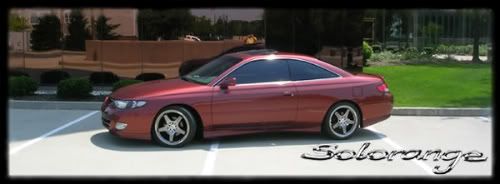Siren2387 wrote: cant be spending that much on gas and only get 17 miles per gallon and the weird thing is is that i can go 2 weeks on one tank of gas. i dunno any ideas what i can do???
this doesn't make sense. Your saying your getting 17mpg but able to go 2 weeks with one tank of gas? You should be getting more mpg then. Double check your math or have your math teacher help you

What I do to compute mpg is pretty basic. Pull up to the pump, pull the handle to start pumping gas, engage the hook that holds the handle down for you, when the tank fills up with gas the pump handle will click and shut off the flow of gas by itself, pay for the gas, get back in the car, press the trip odometer button to reset it back to zero, drive around till the gas gauge starts to get close to the letter E, pump gas back into your car using the previous method, then take the number from your trip odometer and divide it by the number of gallons you put in your car.
I commute 2 hours a day going to/from work and I fill up about once per week and get 23.5-24.5 mpg on average. I drive like I want, rev it like I want, blast the A/C how I want, and usually run full out 80-90 mph.
Everyone should be running the recommended 5w-30 oil in their cars. It has the same temperature range protection as 10w-30 but will improve gas mileage by a mpg. Also, not only because our engines are prone to sludge but we should be using fully synthetic oils which will give you about another mpg improvement. The type of tires you have on your car can impact your mpg ratings by as much as a mpg or 2 because different makes and brands of tires have different rolling resistance numbers. Theoretically, the harder you can make your tires the easier they will roll and the better economy you will get. However, there is a fine line between tire wear, tire performance, and ride quality over fuel economy. You could inflate the tire to its maximum psi rating listed on the sidewall of the tire to achieve the best fuel mileage but at the cost of increased tire wear and poor ride quality. Generally, 32 psi is the recommended tire pressure to run on a standard passenger car to find a good balance of economy over ride quality. Specifically, its best to use the listed tire pressure on the vehicle gross weight sticker inside the drivers side door sill.
Also, Everytime I change my oil I put in some Lucas Upper cylinder lubricant w/Fuel injector cleaner into my gas tank. I notice the tank full that I run through the car that has this stuff in it usually gets closer to 25mpg and then after a couple of tank fulls its starts to go back down to about 24. In fact, I think there was one tank full that I had this stuff in it and I got about 28mpg but I admit I was driving like a granny that week and all highway miles but still that is about the same mileage I routinely get on my Honda Civic.




